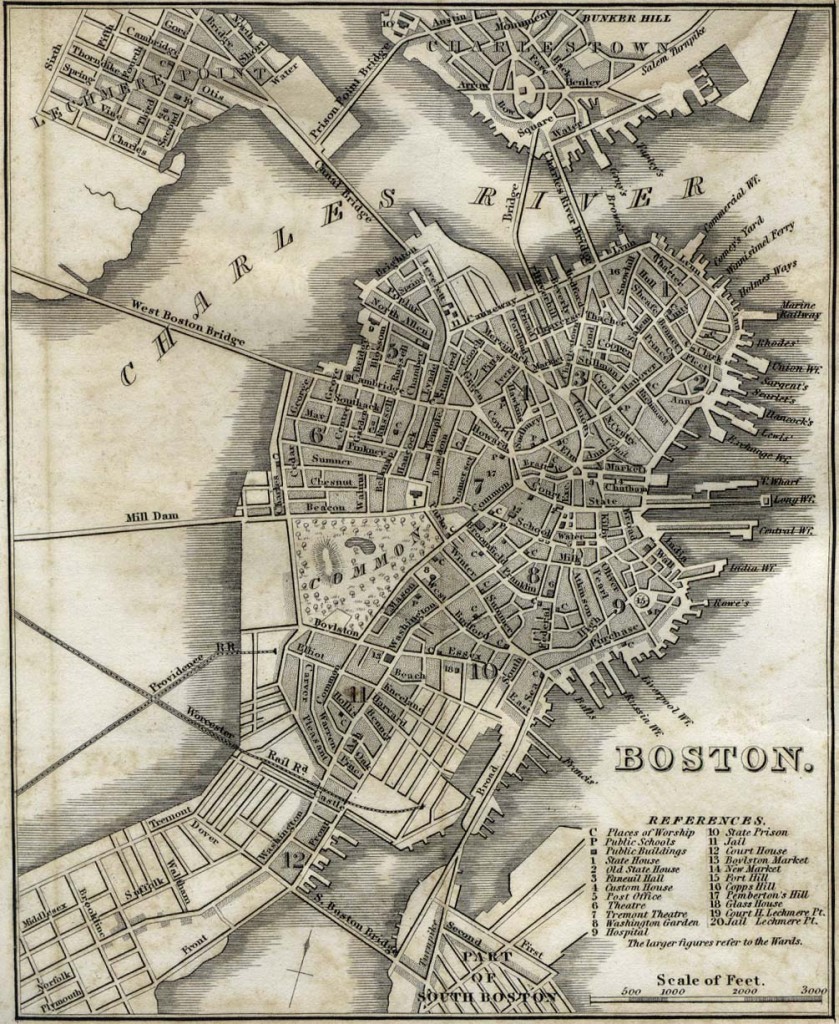 Today I am working on revisions to the introduction of the first chapter in my biography of Robert Gould Shaw. It covers Robert’s early years, including some family background. To introduce the chapter I crafted a scene set just a few blocks from the family’s home on Beacon Street atop Beacon Hill next to the Massachusetts State House in Boston.
Today I am working on revisions to the introduction of the first chapter in my biography of Robert Gould Shaw. It covers Robert’s early years, including some family background. To introduce the chapter I crafted a scene set just a few blocks from the family’s home on Beacon Street atop Beacon Hill next to the Massachusetts State House in Boston.
It’s 1842. Robert’s father Francis balances his 5-year old son on his shoulders as the two gaze out on their city. In this introduction I point out a number of features that connect to the family’s history in the city, including the ships masts in the harbor and smoke pouring from the engines along two rail lines that signify trade and an expanding economy. Generations of Shaws had been involved in Boston’s overseas trade. I also point out the just completed Bunker Hill monument across the Charles River, along with the Old State House, Old South Meeting House, and Granary Burial Ground that connects the Shaws with the Revolution and the founding of the United States.
[The most helpful resource in writing this introduction has been Nancy Seaholes book The Atlas of Boston History. The maps are stunning and along with the short essays really help to make sense of Boston’s history.]I think it works well as an introduction. The only potential problem is that I have no evidence that father and son ever shared such a moment. The closest I can come are accounts of father and son on horseback on one of their many visits to Brook Farm after the family moved to West Roxbury. There is no question that the the two enjoyed a close relationship.
At the end of the introduction I imagine the two walking home with Francis beginning to share the story of the Shaws with Robert. It serves as a nice transition, but again I have no evidence of such a conversation.
So, have I committed the cardinal sin for a historian? What are your thoughts?
Creative nonfiction has no clear cut boundaries, but if you want to add imaginative conversation, you are veering into the realm of historical fiction, and should inform your reader of that fact.
My thoughts are that right now, in 2022, Civil War history is subject to much scrutiny. People who won’t agree with your overall theme of this book could point to an undocumented conversation and try to use that to dismiss the entire book. So whatever you do, you should be very clear that you are connecting documented dots and inferring what conversation might have taken place.
Interestingly, I came back to your post this morning with this thought in mind before reading Mr. Lucas’s comment above.
I think you do excellent work and want this book to stand on its merits. Certainly historians can offer their conclusions based on all their research but what you outlined strikes me as more of an inference than a conclusion.
Hi Carl,
Thanks for the thoughtful comment. I will certainly make clear in the narrative that this is undocumented, but based on other relevant evidence. I want to stress that this is simply a literary device to set the stage for the first chapter. I want my reader to have a sense of the city of Boston in 1842 that RGS’s ancestors helped to develop and a society that his parents challenged through their participation in numerous reform movements. Thanks again.
I think you can keep it if you word it as a *possible* event. “Father might have held the youngster on his shoulders, from which perch he could have seen …”
That’s basically how it is framed. Happy New Year, Jim.
I second Jim’s comment.
Good to hear from you. Hope you didn’t have too much difficulty with the snow. Enjoy it.
And Happy New Year to you and yours!
This is a reasonable imagination and there is always some level of imagination in the work we do.
I agree, Emmanuel. Great to hear from you and Happy New Year.
A fable agreed upon does not assert truth in history, but in truth, your fable has truthfully heinously convoluted history. Thanks for more evidence of your lack of method and fallacies in historiography… You’re quite the propagandist revisionist.
Thanks for the feedback, Michael. I am going to assume that you are uncomfortable with this approach.
One is reminded of Fernand Braudel’s perhaps apocryphal admonition to a young Geoffrey Parker that the greatest single skill any historian ought to possess…is imagination.
Thanks for the response.